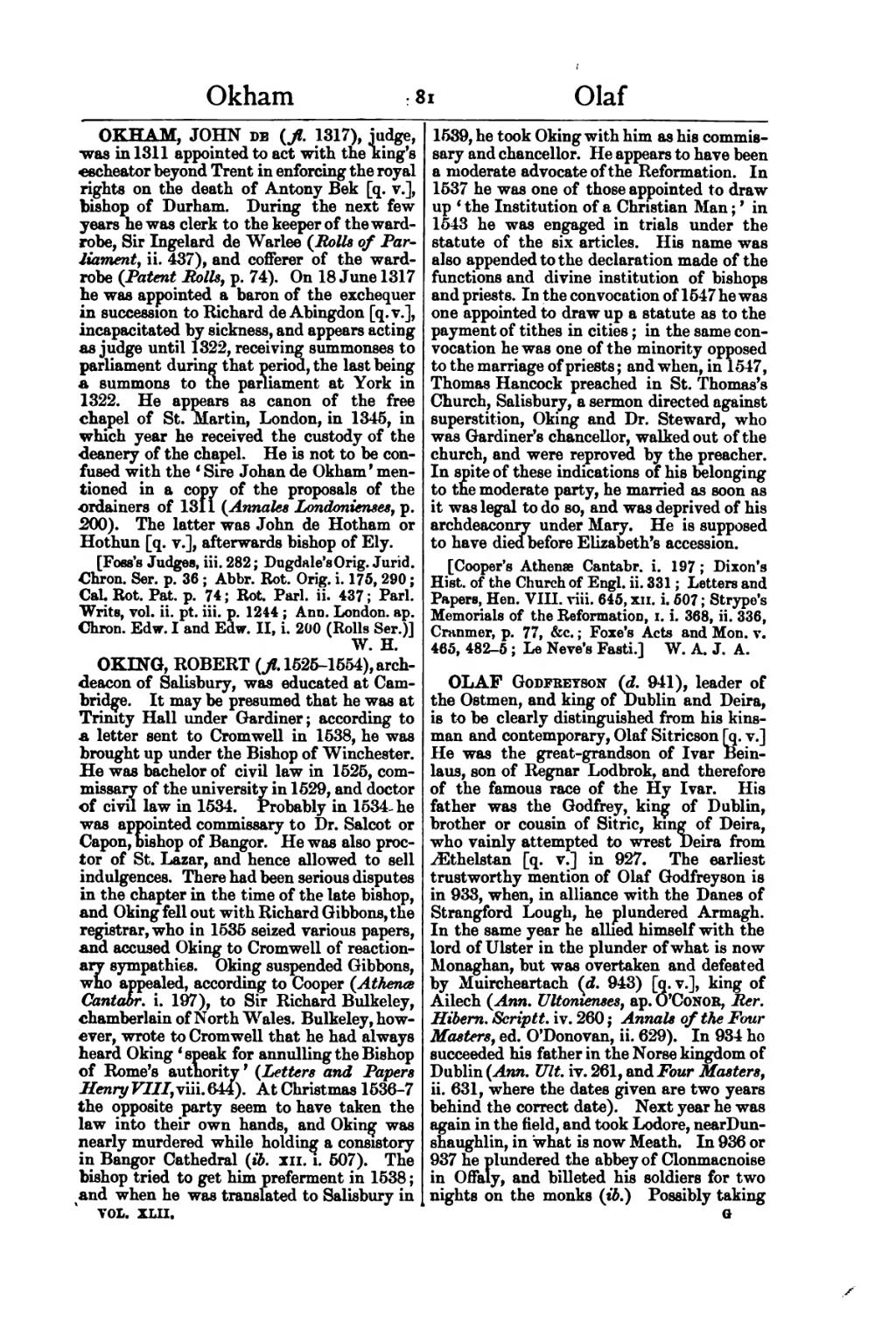OKHAM, JOHN de (fl. 1317), judge, was in 1311 appointed to act with the king's escheator beyond Trent in enforcing the royal rights on the death of Antony Bek [q. v.], bishop of Durham. During the next few years he was clerk to the keeper of the wardrobe, Sir Ingelard de Warlee (Rolls of Parliament, ii. 437), and cofferer of the wardrobe (Patent Rolls, p. 74). On 18 June 1317 he was appointed a baron of the exchequer in succession to Richard de Abingdon [q. v.], incapacitated by sickness, and appears acting as judge until 1322, receiving summonses to parliament during that period, the last being a summons to the parliament at York in 1322. He appears as canon of the free chapel of St. Martin, London, in 1345, in which year he received the custody of the deanery of the chapel. He is not to be confused with the 'Sire Johan de Okham' mentioned in a copy of the proposals of the ordainers of 1311 (Annales Londonienses, p. 200). The latter was John de Hotham or Hothun [q. v.], afterwards bishop of Ely.
[Foss's Judges, iii. 282; Dugdale's Orig. Jurid. Chron. Ser. p. 36; Abbr. Rot. Orig. i. 175, 290; Cal. Rot. Pat. p. 74; Rot. Parl. ii. 437; Parl. Writs, vol. ii. pt. iii. p. 1244; Ann. London, ap. Chron. Edw. I and Edw. II, i. 200 (Rolls Ser.)]
OKING, ROBERT (fl.1525–1554), archdeacon of Salisbury, was educated at Cambridge. It may be presumed that he was at Trinity Hall under Gardiner; according to a letter sent to Cromwell in 1538, he was brought up under the Bishop of Winchester. He was bachelor of civil law in 1626, commissary of the university in 1629, and doctor of civil law in 1634. Probably in 1634 he was appointed commissary to Dr. Salcot or Capon, bishop of Bangor. He was also proctor of St. Lazar, and hence allowed to sell indulgences. There had been serious disputes in the chapter in the time of the late bishop, and Oking fell out with Richard Gibbons, the registrar, who in 1636 seized various papers, and accused Oking to Cromwell of reactionary sympathies. Oking suspended Gibbons, who appealed, according to Cooper (Athenæ Cantabr, i. 197), to Sir Richard Bulkeley, chamberlain of North Wales. Bulkeley, however, wrote to Cromwell that he had always heard Oking 'speak for annulling the Bishop of Rome's authority' (Letters and Papers Henry VIII, viii. 644). At Christmas 1630-7 the opposite party seem to have taken the law into their own hands, and Oking was nearly murdered while holding a consistory in Bangor Cathedral (ib. xii. i. 607). The bishop tried to get him preferment in 1638; and when he was translated to Salisbury in he took Oking with him as his commissary and chancellor. He appears to have been a moderate advocate of the Reformation. In 1637 he was one of those appointed to draw up 'the Institution of a Christian Man;' in 1643 he was engaged in trials under the statute of the six articles. His name was also appended to the declaration made of the functions and divine institution of bishops and priests. In the convocation of 1647 he was one appointed to draw up a statute as to the payment of tithes in cities; in the same convocation he was one of the minority opposed to the marriage of priests; and when, in 1647, Thomas Hancock preached in St. Thomas's Church, Salisbury, a sermon directed against superstition, Oking and Dr. Steward, who was Gardiner's chancellor, walked out of the church, and were reproved by the preacher. In spite of these indications of his belonging to the moderate party, he married as soon as it was legal to do so, and was deprived of his archdeaconry under Mary. He is supposed to have died before Elizabeth's accession.
[Cooper's Athenæ Cantabr. i. 197; Dixon's Hist. of the Church of Engl. ii. 831; Letters and Papers, Hen. VIII. viii. 646, xii. i. 507; Strype's Memorials of the Reformation, i. i. 368, ii. 336, Cranmer, p. 77, &c.; Foxe's Acts and Mon. v. 465, 482-6; Le Neve's Fasti.]
OLAF Godfreyson (d. 941), leader of the Ostmen, and king of Dublin and Deira, is to be clearly distinguished from his kinsman and contemporary, Olaf Sitricson [q. v.] He was the great-grandson of Ivar Beinlaus, son of Regnar Lodbrok, and therefore of the famous race of the Hy Ivar. His father was the Godfrey, king of Dublin, brother or cousin of Sitric, king of Deira, who vainly attempted to wrest Deira from Æthelstan [q. v.] in 927. The earliest trustworthy mention of Olaf Godfreyson is in 933, when, in alliance with the Danes of Strangford Lough, he plundered Armagh. In the same year he allied himself with the lord of Ulster in the plunder of what is now Monaghan, but was overtaken and defeated by Muircheartach (d. 943) [q. v.], king of Ailech (Ann. Ultonienses, ap. O'Conor, Rer, Hibern. Scriptt. iv. 260; Annals of the Four Masters, ed. O'Donovan, ii. 629). In 934 he succeeded his father in the Norse kingdom of Dublin (Ann. Ult. iv. 261, and Four Masters, ii. 631, where the dates given are two years behind the correct date). Next year he was again in the field, and took Lodore, near Dunshaughlin, in what is now Meath. In 936 or 937 he plundered the abbey of Clonmacnoise in Offaly, and billeted his soldiers for two nights on the monks (ib.) Possibly taking
